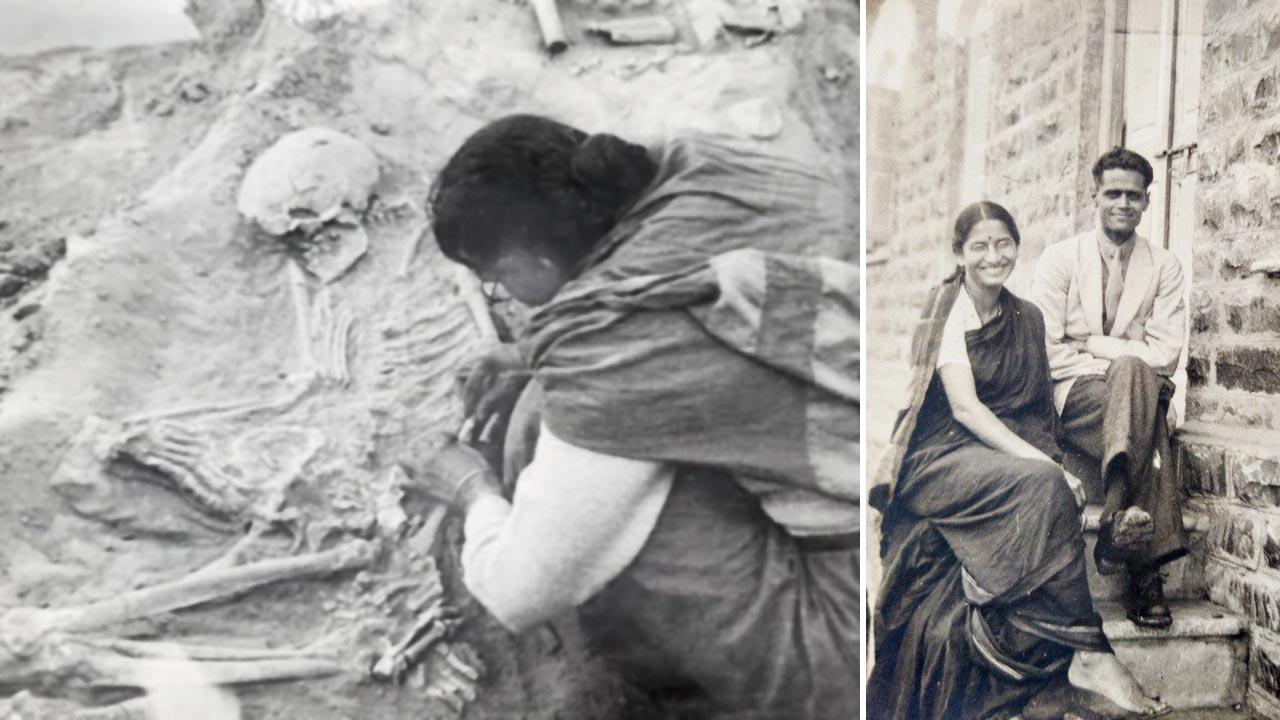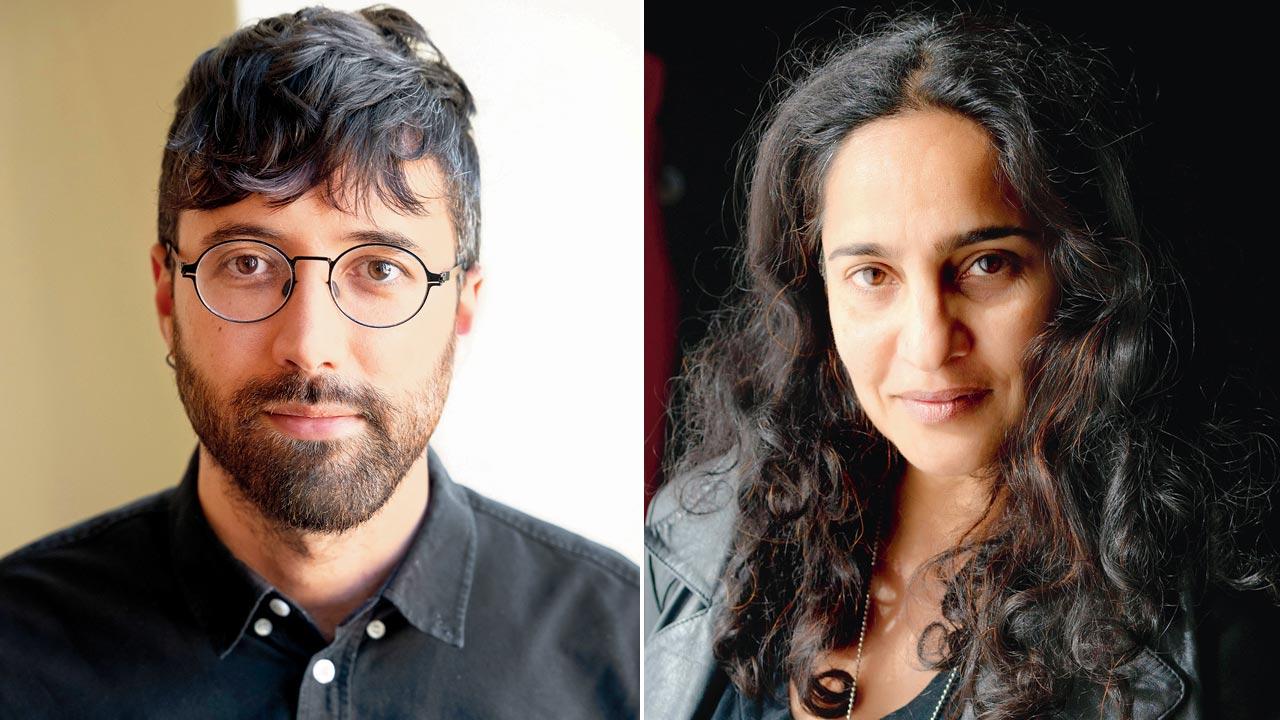A new biography on Irawati Karve, the trailblazing sociologist, anthropologist and educator, speaks about the little moments in between the big achievements that made her life extraordinary

Irawati with her Lambretta scooter, 1950; (right) Irawati with her granddaughter
Dinu and Iru are aboard a steamship that is returning from Europe to India. On dreary days, they decide to “embroider a whole tablecloth together”. Over the years, this will be passed down as a family heirloom; all their children and grandchildren will have heard of it. Today, though lost, it remains treasured through its story. “Sometimes, a thing resides in the memories of those who saw it and knew what meaning it held, beyond its function,” write her granddaughter Urmilla Deshpande and Thiago Pinto Barbosa in Iru (Speaking Tiger), an intimate new biography of Irawati Karve (1905-70). Stories about her home, travels, friendships, and conversations at work, make up the five sections of the book. To the world, Karve was a woman who walked across Berlin and parts of Maharashtra, measuring skulls and bones, to reveal the cracks on which Eurocentric and Brahmanical beliefs of the 1920s were built. To her husband, Dinkar Karve (Dinu), and her children, she was Iru.
ADVERTISEMENT
 Fieldwork in 1944. Pics Courtesy/Urmilla Deshpande; (right) Iru and Dinu at the house on Law College Road, 1931
Fieldwork in 1944. Pics Courtesy/Urmilla Deshpande; (right) Iru and Dinu at the house on Law College Road, 1931
The anthropologist, sociologist, educator and writer lived on Pune’s Law College Road, and drove her Lambretta scooter to work at the iconic Deccan College. Here, she started and headed the anthropology department. Pune, at the time, had already “hosted several renowned academic and other learning institutions,” shares Barbosa. “It was also at the centre of crucial national events, being an important base for key social reformist and nationalist movements during the colonial era.” Karve had been responding to these events. Her essays, her fieldwork on the outskirts of Pune, and her masterpiece Yuganta, a critical examination of The Mahabharata, demonstrate her understanding of the society.
 Thiago Pinto Barbosa and Urmilla Deshpande
Thiago Pinto Barbosa and Urmilla Deshpande
Her early discoveries, however, began in Weimar Berlin in the 1920s, when she went for her doctoral studies in anthropology. (The Weimar Republic is the name given to the German government between the end of the Imperial period (1918) and the beginning of Nazi Germany (1933). Inspired by Berlin, “replete with possibilities, particularly fraught and historically significant,” Deshpande wanted to write a novel based on Karve’s Berlin years. “I knew very little about Iru, aside from my own experience. No one said much about her; no one told any stories. She was in a way ‘just’ a family member.”
 Cooking on site during fieldwork
Cooking on site during fieldwork
She adds, “Maybe her loss was a shock that my mother’s generation didn’t properly get over. My mother talked about her as her mother.” But that’s all she had, she recollects. Meanwhile, Barbosa had been working on his dissertation about Karve’s life in Germany, having stumbled upon her work while researching German scientific racism. “Irawati stood out as the only researcher at a centre for racial and eugenics research who challenged the theory of that time and place.” The book brought both writers together about four years ago.
 In Berlin’s KWI-A with human skulls during her PhD, 1928
In Berlin’s KWI-A with human skulls during her PhD, 1928
“A young man from Belo Horizonte in Brazil, and a (then) 57-ish woman who grew up in Bombay,” as Deshpande puts it; the two walked the streets of Berlin, searching for traces of Karve. Over time, they developed a deep friendship, speaking on the phone for hours and exchanging letters and books with each other. They realised that, in addition to their shared admiration for Irawati, they shared a love of South American magical realism. Barbosa felt that “the genre [related] to the way some books in South Asian literature narrate family stories. Iru is not a ‘magical’ book, but we cultivated some elements of enchantment about life in it.”
It’s why readers will notice a singular voice in the book, despite their differing cultures and fields of study. Additionally, Karve’s alacrity and discernment, which refused to turn a blind eye on the baselessness of the dominant ideologies of the time, reflect in stories from her personal and professional life. “She would talk to people on trains, overhear or request for songs, and let her curiosity guide her research questions.” In her last days, Karve would take long walks in the forest with her student, Maxine Berntsen, and would be “especially attentive and appreciative of the birds and their sounds,” reveals Barbosa.
Deshpande’s passion for reconstructing time and place strengthens Karve’s narrative. “Making the past real, placing someone in it, walking with them, feeling their feelings; I feel liberated now that we have done this biography,” she admits. “We are no longer bound by her life and reality, and the Irawati of imagination is free to live how she wants.”
AVAILABLE Leading bookstores and e-stores
COST Rs 699
Also Read: Art finds a new home in Fort
 Subscribe today by clicking the link and stay updated with the latest news!" Click here!
Subscribe today by clicking the link and stay updated with the latest news!" Click here!







